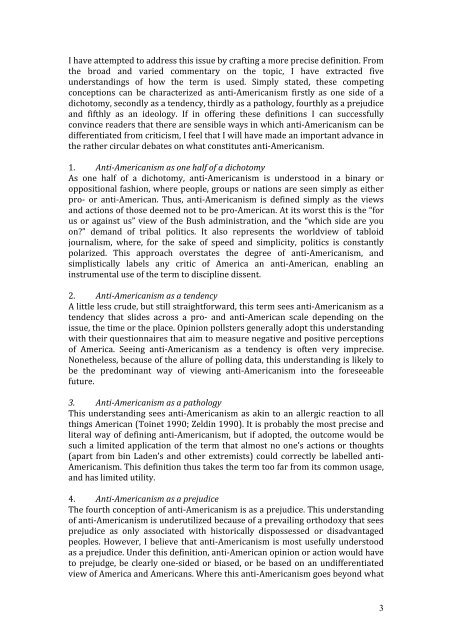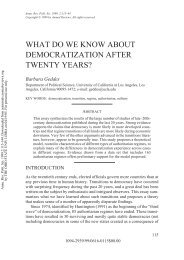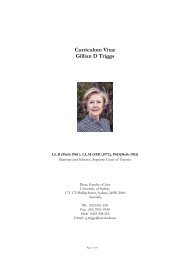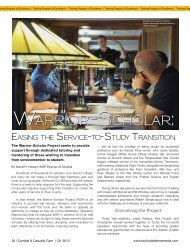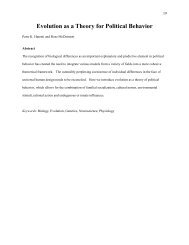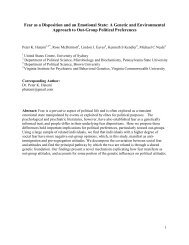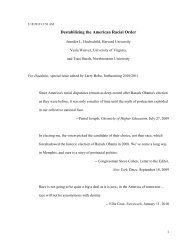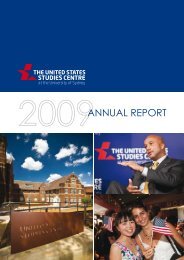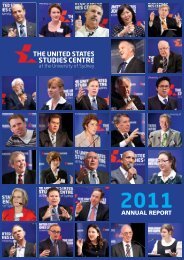the anti-american tradition: a literature review - United States ...
the anti-american tradition: a literature review - United States ...
the anti-american tradition: a literature review - United States ...
You also want an ePaper? Increase the reach of your titles
YUMPU automatically turns print PDFs into web optimized ePapers that Google loves.
I have attempted to address this issue by crafting a more precise definition. From<br />
<strong>the</strong> broad and varied commentary on <strong>the</strong> topic, I have extracted five<br />
understandings of how <strong>the</strong> term is used. Simply stated, <strong>the</strong>se competing<br />
conceptions can be characterized as <strong>anti</strong>‐Americanism firstly as one side of a<br />
dichotomy, secondly as a tendency, thirdly as a pathology, fourthly as a prejudice<br />
and fifthly as an ideology. If in offering <strong>the</strong>se definitions I can successfully<br />
convince readers that <strong>the</strong>re are sensible ways in which <strong>anti</strong>‐Americanism can be<br />
differentiated from criticism, I feel that I will have made an important advance in<br />
<strong>the</strong> ra<strong>the</strong>r circular debates on what constitutes <strong>anti</strong>‐Americanism.<br />
1. AntiAmericanism as one half of a dichotomy<br />
As one half of a dichotomy, <strong>anti</strong>‐Americanism is understood in a binary or<br />
oppositional fashion, where people, groups or nations are seen simply as ei<strong>the</strong>r<br />
pro‐ or <strong>anti</strong>‐American. Thus, <strong>anti</strong>‐Americanism is defined simply as <strong>the</strong> views<br />
and actions of those deemed not to be pro‐American. At its worst this is <strong>the</strong> “for<br />
us or against us” view of <strong>the</strong> Bush administration, and <strong>the</strong> “which side are you<br />
on” demand of tribal politics. It also represents <strong>the</strong> worldview of tabloid<br />
journalism, where, for <strong>the</strong> sake of speed and simplicity, politics is constantly<br />
polarized. This approach overstates <strong>the</strong> degree of <strong>anti</strong>‐Americanism, and<br />
simplistically labels any critic of America an <strong>anti</strong>‐American, enabling an<br />
instrumental use of <strong>the</strong> term to discipline dissent.<br />
2. AntiAmericanism as a tendency<br />
A little less crude, but still straightforward, this term sees <strong>anti</strong>‐Americanism as a<br />
tendency that slides across a pro‐ and <strong>anti</strong>‐American scale depending on <strong>the</strong><br />
issue, <strong>the</strong> time or <strong>the</strong> place. Opinion pollsters generally adopt this understanding<br />
with <strong>the</strong>ir questionnaires that aim to measure negative and positive perceptions<br />
of America. Seeing <strong>anti</strong>‐Americanism as a tendency is often very imprecise.<br />
None<strong>the</strong>less, because of <strong>the</strong> allure of polling data, this understanding is likely to<br />
be <strong>the</strong> predominant way of viewing <strong>anti</strong>‐Americanism into <strong>the</strong> foreseeable<br />
future.<br />
3. AntiAmericanism as a pathology<br />
This understanding sees <strong>anti</strong>‐Americanism as akin to an allergic reaction to all<br />
things American (Toinet 1990; Zeldin 1990). It is probably <strong>the</strong> most precise and<br />
literal way of defining <strong>anti</strong>‐Americanism, but if adopted, <strong>the</strong> outcome would be<br />
such a limited application of <strong>the</strong> term that almost no one’s actions or thoughts<br />
(apart from bin Laden’s and o<strong>the</strong>r extremists) could correctly be labelled <strong>anti</strong>‐<br />
Americanism. This definition thus takes <strong>the</strong> term too far from its common usage,<br />
and has limited utility.<br />
4. AntiAmericanism as a prejudice<br />
The fourth conception of <strong>anti</strong>‐Americanism is as a prejudice. This understanding<br />
of <strong>anti</strong>‐Americanism is underutilized because of a prevailing orthodoxy that sees<br />
prejudice as only associated with historically dispossessed or disadvantaged<br />
peoples. However, I believe that <strong>anti</strong>‐Americanism is most usefully understood<br />
as a prejudice. Under this definition, <strong>anti</strong>‐American opinion or action would have<br />
to prejudge, be clearly one‐sided or biased, or be based on an undifferentiated<br />
view of America and Americans. Where this <strong>anti</strong>‐Americanism goes beyond what<br />
3


